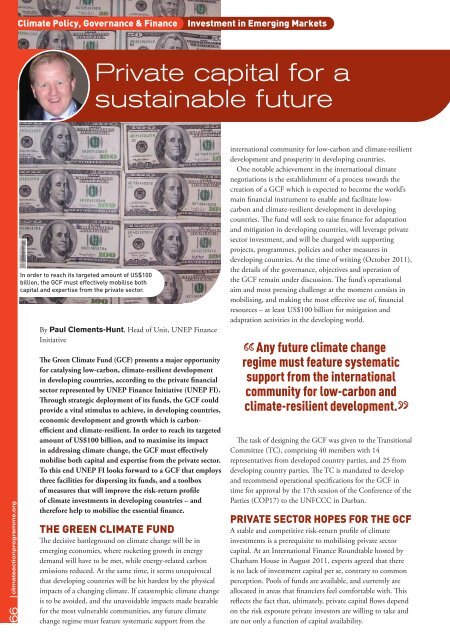Climate Action 2011-2012
You also want an ePaper? Increase the reach of your titles
YUMPU automatically turns print PDFs into web optimized ePapers that Google loves.
<strong>Climate</strong> Policy, Governance & Finance<br />
investment in emerging markets<br />
Private capital for a<br />
sustainable future<br />
66 climateactionprogramme.org<br />
© yomanimus<br />
In order to reach its targeted amount of US$100<br />
billion, the GCF must effectively mobilise both<br />
capital and expertise from the private sector.<br />
By Paul Clements-Hunt, Head of Unit, UNEP Finance<br />
Initiative<br />
The Green <strong>Climate</strong> Fund (GCF) presents a major opportunity<br />
for catalysing low-carbon, climate-resilient development<br />
in developing countries, according to the private financial<br />
sector represented by UNEP Finance Initiative (UNEP FI).<br />
Through strategic deployment of its funds, the GCF could<br />
provide a vital stimulus to achieve, in developing countries,<br />
economic development and growth which is carbonefficient<br />
and climate-resilient. In order to reach its targeted<br />
amount of US$100 billion, and to maximise its impact<br />
in addressing climate change, the GCF must effectively<br />
mobilise both capital and expertise from the private sector.<br />
To this end UNEP FI looks forward to a GCF that employs<br />
three facilities for dispersing its funds, and a toolbox<br />
of measures that will improve the risk-return profile<br />
of climate investments in developing countries – and<br />
therefore help to mobilise the essential finance.<br />
The Green ClimaTe Fund<br />
The decisive battleground on climate change will be in<br />
emerging economies, where rocketing growth in energy<br />
demand will have to be met, while energy-related carbon<br />
emissions reduced. At the same time, it seems unequivocal<br />
that developing countries will be hit hardest by the physical<br />
impacts of a changing climate. If catastrophic climate change<br />
is to be avoided, and the unavoidable impacts made bearable<br />
for the most vulnerable communities, any future climate<br />
change regime must feature systematic support from the<br />
international community for low-carbon and climate-resilient<br />
development and prosperity in developing countries.<br />
One notable achievement in the international climate<br />
negotiations is the establishment of a process towards the<br />
creation of a GCF which is expected to become the world’s<br />
main financial instrument to enable and facilitate lowcarbon<br />
and climate-resilient development in developing<br />
countries. The fund will seek to raise finance for adaptation<br />
and mitigation in developing countries, will leverage private<br />
sector investment, and will be charged with supporting<br />
projects, programmes, policies and other measures in<br />
developing countries. At the time of writing (October <strong>2011</strong>),<br />
the details of the governance, objectives and operation of<br />
the GCF remain under discussion. The fund’s operational<br />
aim and most pressing challenge at the moment consists in<br />
mobilising, and making the most effective use of, financial<br />
resources – at least US$100 billion for mitigation and<br />
adaptation activities in the developing world.<br />
Any future climate change<br />
regime must feature systematic<br />
support from the international<br />
community for low-carbon and<br />
climate-resilient development.<br />
The task of designing the GCF was given to the Transitional<br />
Committee (TC), comprising 40 members with 14<br />
representatives from developed country parties, and 25 from<br />
developing country parties. The TC is mandated to develop<br />
and recommend operational specifications for the GCF in<br />
time for approval by the 17th session of the Conference of the<br />
Parties (COP17) to the UNFCCC in Durban.<br />
PrivaTe seCTor hoPes For The GCF<br />
A stable and competitive risk-return profile of climate<br />
investments is a prerequisite to mobilising private sector<br />
capital. At an International Finance Roundtable hosted by<br />
Chatham House in August <strong>2011</strong>, experts agreed that there<br />
is no lack of investment capital per se, contrary to common<br />
perception. Pools of funds are available, and currently are<br />
allocated in areas that financiers feel comfortable with. This<br />
reflects the fact that, ultimately, private capital flows depend<br />
on the risk exposure private investors are willing to take and<br />
are not only a function of capital availability.












